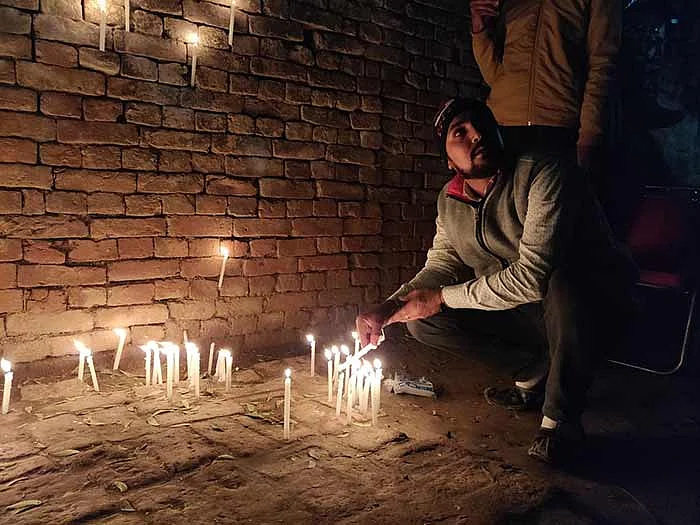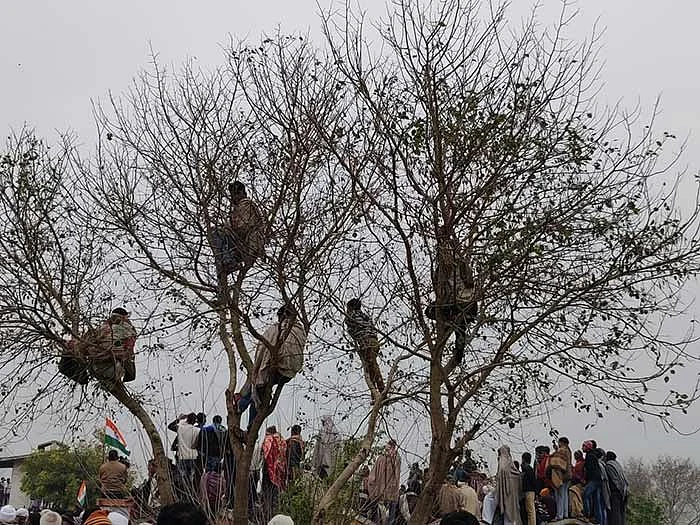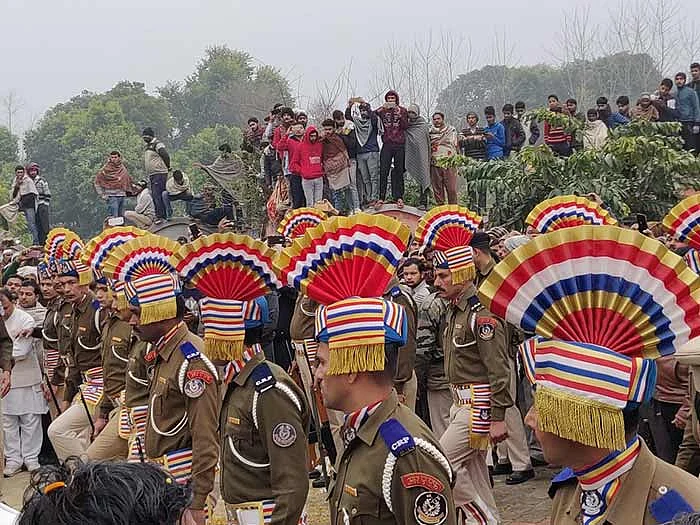Of Pradeep Kumar’s mettle and martyrdom
Kumar’s 18-year-old son refuses to shed a single tear. It was the last thing his father had asked of him—to be strong.
Friday, 7.30 pm
As one enters the interiors of the Shamli tehsil in West Uttar Pradesh, making their way towards the village of Banat, the topography changes: highways turn into narrow roads, buildings become bungalows, and vehicular traffic is replaced by crop fields on both sides. You will find your occasional fruit seller perched at the end of the road, or your friendly neighbourhood tailor noisily sewing away at his machine. But on Friday evening—one day after more than 40 CRPF personnel lost their lives in a terrorist attack in Kashmir’s Pulwama district—Banat had come to a standstill.
Pradeep Kumar, one of the CRPF personnel who was killed in the Feb 14 attack, hailed from this village. On Thursday, a suicide bomber had rammed a van filled with 350 kg of explosives into an Army convoy in Kashmir’s Pulwama district. The attack was the largest of its kind that Kashmir has seen in the past two decades; it has sent shockwaves throughout the country.
Banat resembled a ghost town on Friday evening—up until the small colony of Pratap Nagar. The marketplace had been shut down and there was barely any sign of life on the roads. As one walked through the serpentine narrow paths in between clustered two-storeyed bungalows, past the Hanuman temple and gigantic peepal tree, chants of “Pakistan Murdabad” could be heard growing louder and clearer. These sounds were coming from near Kumar’s house.
Next to Kumar’s house was a small ground where a shamiana had been erected. The ground was occupied by men and women from the village—at least 200 of them, who had been standing there all day. As the evening proceeded, these villagers, draped in shawls to combat the wind and light rain, lit candles to honour Kumar’s memory. Others looked on from their windows and terraces.

Standing still amid all the chanting and sloganeering was Kumar’s 18-year-old son, Siddharth. He stood with his hands crossed across his chest and head facing down. His spectacles were askew. He looked exhausted yet determined, as he remained rooted to the spot for as long as it took for the demise of his father to sink in, or for the shock of it to wear off.
Siddharth, who studies in Class XII of a Kendra Vidyalaya in Ghaziabad, recalls that it was in a photograph that he had first seen his father in an Army uniform. “I was almost 11 years old when I first saw him wear the uniform in person,” he said. “I was spending my summer vacation with him in Rampur. This was the first—and last—time that I saw him wearing it in person. In all the time that I have known him, he has barely spent maybe one-two years with me since he used to be away on duty most of the time. Papa hamesha kehte the ki job hi aisa hai ki hume jaan hatheli pe rakhni padhti hai (Father always used to say that the job is such that it requires him to wear his heart on his sleeve all the time). He used to make me understand that if anything ever happened to him, it would be my duty to take care of my mother and brother.”
Although, the Kumar family hails from Banat gaon (village), where their ancestral home is located, Siddharth, along with his mother and 15-year-old brother Vijyant Kumar, lives in Ghaziabad. Back in the village, Pradeep is remembered as someone who was an avid lover of sports and who embodied the true spirit of sportsmanship. “He never saw religion, caste, or status of people he was playing with or competing against,” recalls Vikrant Burman, who was Kumar’s junior in school. “He was an all-rounder: an ace at sports and also the class monitor. In all the time that I knew him, I’ve never seen him pick a fight with anyone. Woh shaantipriya insaan the (he was a peace-loving man),” Burman said. His strength to take criticism and convert that negativity into something positive and productive distinguished him from anyone else, he added. “Today, we are proud and sad. Sad because he is not among us anymore, and proud because now, our village will be known as shaheed ka gaon (a martyr’s village).”
Even 18-year-old Siddharth remembers his father’s sportsmanship. “He used to play almost all the sports ever since his training days in the Army—and was instrumental in making his battalion win most of the time.”
Pradeep Kumar wasn’t the only one from Shamli who lost his life in the Pulwama terror attack. Amit Kumar, who hails from the same tehsil, was also martyred.
At 2.30 pm on February 14, Siddharth had spoken to his father over the phone. “He told me his convoy would be reaching Srinagar in about two hours, but later when I tried his phone at around 6 pm, it was switched off. I tried again and again but I was unable to get through to him,” he said. “We don’t have a television at our house in Ghaziabad since we have exams, so I took my mother and brother and went to our nani’s (grandmother’s) house nearby. By this time, people from the village (Banat) had already started calling and indirectly asking where my father was…maybe they already knew what had happened. But nobody said anything. And neither did I, either to my mother or my brother.”
But once they switched on the television, the news of more than 40 CRPF personnel being killed in a terrorist attack was splashed across TV screens. “They showed on TV that 21 Battalion ke Pradeep Kumar shaheed ho chuke hai,” said Siddharth. His voice was breaking and he was blankly staring at the ground. “Dil maane ko tayyar hi nahi tha; koi aur bhi ho sakta tha jiska naam same ho aur jo 21 battalion se ho. (We just couldn’t believe it. It could be someone else from the same battalion).”
The Kumar family left Ghaziabad and reached Banat at 4 am on Friday. “After coming here, my mother and dadi (paternal grandmother) have been crying a lot. They can’t hold back their tears. But my father always told me that if anything ever happened to him, I must never cry or shed tears for him—for I had to be strong for my mother and the rest of my family. So no matter how much I want[ed] to cry, I had to be strong. To hold it together. Kismat waale soldiers hote hai jinko shaahdat milti hai (Lucky are those soldiers who achieve martyrdom).”
Siddharth also spoke about revenge. “I only want to say one thing: ‘Khoon ke badle khoon aur ek sir ke badle dus sir katne chahiye. (Blood for blood, ten heads instead of one). Only if this happens will it feel like we have extracted some sort of revenge. Ataankvadiyon se baat-cheet karke na kisi desh ka faayda hua hai aur na hi hoga. (Talking to militants have been beneficial for no nation, nor will it be). If my father would have died in battle I would have been happy, but the fact that he was killed while he was travelling in a convoy is painful. He was unarmed. He had visited us in Ghaziabad just two days before [the incident] and I didn’t get to say goodbye to him properly because I had gone to get milk from the shop and by the time I was back he had already packed his bags and was ready to leave. So I dropped him off at the adda (bus stop). He told me he would see me again in three months and asked me to take care of my mother.”
With midnight approaching, Siddharth walked back towards the ground, where a group of villagers had queued up to light candles in front of his father’s poster. A few of them said some kind words, others shielded the candles from wind and rain. One of them loudly chanted: “Jab tak sooraj chaand rahega (As long as the sun and moon are there),” with the others following in close unison: “Deepak Kumar amar rahega (Deepak Kumar will be mortal).” Siddharth stood at the back with arms folded, staring at the candles. Or maybe it was his father’s picture. It was difficult to tell.
Saturday, 7 am
Pradeep Kumar’s body reached Banat a little after the crack of dawn. It was placed under the shamiana that stretched across a portion of the ground located on the road in front of his house. The entire village was there. People stood on terraces of nearly every house, on boundary walls, and had even climbed up trees. Uniformed Army men stood inside the ground. They had created a passage for people to pass through and pay their last respects to Deepak Kumar. Siddharth, his uncle, and other relatives and friends stood by the body, accepting condolences.


Many of the villagers held the national flag in their hands. Others were recording the entire ordeal as it unfolded on their phones. However, it was the camera crew of various news channels who held the best seat in the house—perched at strategical angles on the highest rooftops. Some cut the queue and shoved people to try and make some space for some “artistic” clicks, while a few others spoke loudly over the phone coordinating their next spot.
Amid all the determined chaos came a howl —followed by a deafening wail—from the Kumar residence. It was Siddharth’s mother, sobbing inconsolably. Her friends and female neighbours tried to calm and subdue her but in vain. When she came to pay her last respects to her husband, she fell to the ground, crying, refusing to leave. A villager who was standing next to the head of police security said: “Sir, unko ek baar chehra toh dikha do (Sir, at least show her her husband’s face one last time).” But the officer refused. “Shamshaan pe (At the cemetery),” came the response.

At around 9 am, all the villagers, along with police and Army personnel, walked through the serpentine lanes of Banat, to a cremation ground approximately 600 meters away. This space swelled to its full capacity with the number of people who had come to witness the last rites of Pradeep Kumar. His body was moved to the funeral pyre at the centre of the ground.
Army personnel—on command of their chief—fired three disciplined shots into the air. There was a moment of silence, followed by: “Pradeep Kumar zindabad!”
Epilogue
Siddharth remembers a funny story of him and his father. “I had become fat—just a little fat (smiles sheepishly)—sometime back. So, to make me regularly exercise, my father used to wake me up at 5 am and take me for a run. I never used to wake up but he was a disciplined man—he used to wake up at 4 am every day irrespective of how late he’d slept the previous night. Then, he would take me swimming in the evening. He used to push me and motivate me whenever I got tired—which was often. But he would say: ‘Come on, do two more laps.’ He was—is—more like a friend to me. Woh mere saath kushti ladte the, aur panja bhi (He used to wrestle and arm-arm-wrestle with me). I remember defeating him one day, that’s when he said: ‘aaj tu bada ho gaya’ (You’ve become a grown up today).”
Nearly 48 hours after the news of his father’s demise, Siddharth says he feels a little calmer and relaxed. “I just never thought my dad would leave in this manner. I wanted to do something for him—something big. He would have finished 20 years in service in the next four years and was thinking of taking voluntary retirement. He wanted to start an NGO and wanted me to become a chartered account and take care of it. He envisioned it as a place where anyone—irrespective of their religion or caste or status—could come and ask for help, and we would educate them and make them better human beings.”
